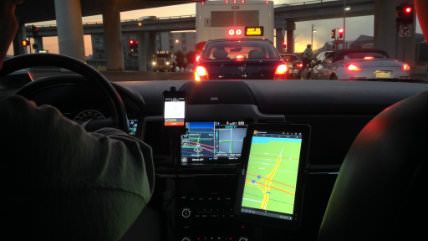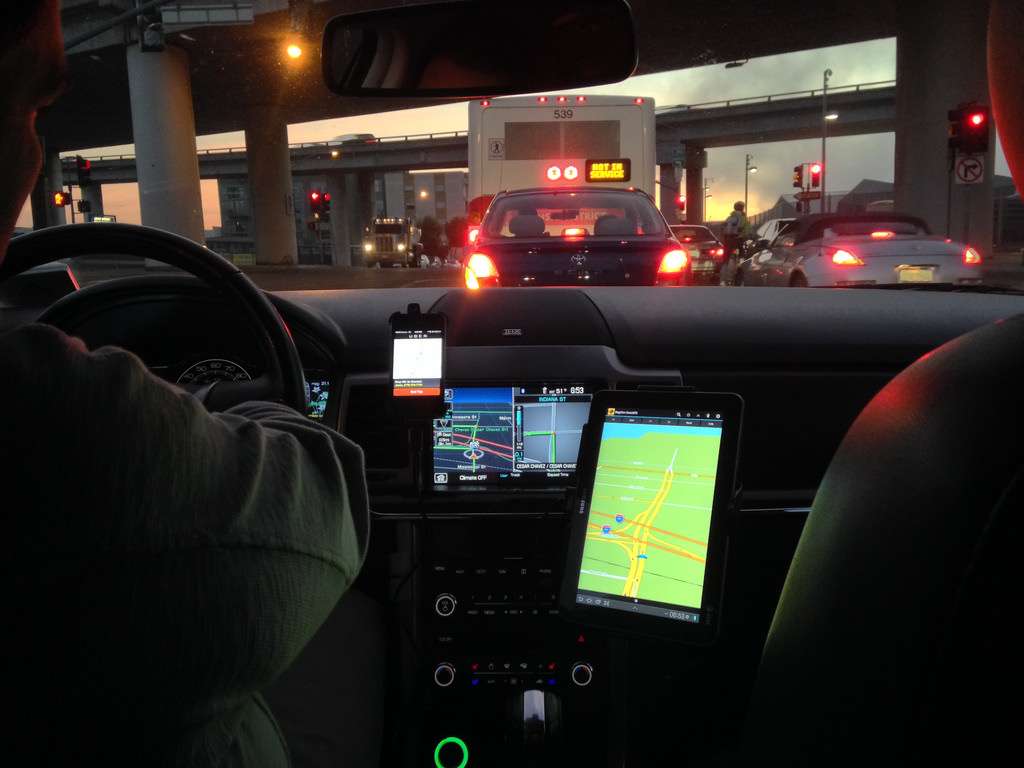Uber Should Keep Employing Drivers With Criminal Backgrounds
Uber can keep customers safe without fingerprinting all applicants or adopting excessively punitive policies toward people who committed crimes long ago.


Uber has come under public fire lately for perceived failure to adequately screen drivers. Los Angeles and San Francisco prosecutors recently amended a consumer protection lawsuit they brought against Uber last year, alleging Uber misled customers about the ride service's safety, including the stringency of its driver background checks. The amended civil complaint details the criminal histories of 25 California Uber drivers between the two cities whom prosecutors believe should have been screened out. Among those profiled were one driver convicted of "kidnapping for ransom with a firearm" in 1994, some individuals on the state sex-offender registry, and several convicted of driving under the influence or welfare fraud.
"According to the amended lawsuit complaint, one driver was convicted of second-degree murder in Los Angeles and spent 26 years in prison," the Los Angeles Times reports.
He gave a different name when he applied to drive for Uber, and a background report said he had no known aliases and no criminal history, the complaint said. The driver gave 1,168 rides over seven months, according to the prosecutors' court filing.
Note that nothing happened to suggest that this driver was unfit to safely transport Uber customers. The California prosecutors' concerns are not that Uber drivers with criminal backgrounds have been misbehaving, but merely that they are able to work as drivers at all. (We prefer our formerly-incarcerated to live in aimless poverty until we can lock them back up for parole violations…)
"Whether ride-hail drivers should be held to the same background-check standards as taxi drivers has been the subject of hours of testimony at Los Angeles City Hall," the Times notes. City officials think Uber should use LiveScan, the comprehensive background-checking service favored by prosecutors and taxi companies. But—as Uber Chief Security Officer Joe Sullivan notes in a blog post—LiveScan, which relies on fingerprinting, is likely to exclude many people unfairly.
… the FBI database and the state databases against which Live Scan fingerprints are matched include arrest records for people who were never charged let alone convicted. This known issue often flags innocent people, unfairly discriminating against them and preventing them from earning a living. Live Scan also does not include convictions if fingerprints were not taken at the time of arrest.
A 2014 Wall Street Journal investigation found the FBI's records often fail to indicate whether those arrested were ever charged or had charges dropped, or where the arrest was ultimately found to be in error. … A 2013 report by the National Employment Law Project (NELP) found that "1.8 million workers a year are subject to FBI background checks that contain faulty or incomplete information."
The issue of unfairly flagging an innocent person is a particular issue for minorities.
For example, the Black Organizing Project, an Oakland, California-based nonprofit, found that between 2006 and 2012 black young men made up almost 75% of all juvenile arrests–even though they made up less than 30% of the city's under-18 population. Of those arrested, nearly 80% were not prosecuted, but would have records in the FBI database that would be returned in a Live Scan criminal background check, preventing them from earning a living.
"Although there are benefits of using biometric identification in a background check process … biometric background check processes may miss 7.5% of criminals with low quality fingerprints," Sullivan pointed out.
In 2014 at least 600 people in San Diego, Los Angeles, and San Francisco—all cities that require taxi drivers to go through Live Scan—who previously drove taxis failed our background check. These drivers were not given access to Uber's platform, but may continue transporting passengers by taxi. Their records included convictions for sex offenses or rape (19 potential drivers), DUIs (36 potential drivers), child endangerment or abuse (seven potential drivers), and assault or battery (51 potential drivers).
Sullivan also noted that Uber's background-check process is in compliance with California requirements, and that two of the sex offenders Uber "failed" to catch are not on the California Department of Justice's sex-offender list. But is such bureaucratic blame-passing beside the point? In an op-ed for The Hill this week, Columbia student and activist Nikita Mary Singareddy argued that we shouldn't be so focused on "whether or not Uber performed its obligatory due diligence" in checking drivers' background.
"Some are furious that the formerly incarcerated have driven thousands of unwitting users. Others believe (California prosecutors) are cherry-picking the few ex-offenders that went undetected," wrote Singareddy. "Yet, this parry and thrust between critics and defenders will never find a resolution. And for good reason—the media blitzkrieg has less to do with actual safety and more to do with our treatment of the formerly incarcerated."
While studies have shown post-prison employment to reduce recidivism, many former prisoners find it difficult to impossible to find legit work after their release. "We should hope that more companies institute fair screening for those with past convictions," writes Singareddy.
There are already so many collateral consequences for those with a criminal record, from the inability to rent an apartment to voting in an election. If we care about civil rights, we should look at these civil suits more holistically and instead applaud Uber–and companies like Walmart, Koch Industries, and Target–for committing to end hiring discrimination against returning citizens.
Helping those who've been imprisoned reacclimate to outside life is part of the current criminal justice reform movement, and this involves repealing and preventing government policies that limit their successful reintegration into the community. Obviously Uber has good reason to prevent certain sorts of recent offenders from working as drivers, but the company already has policies in place that do that. Occassionally people—like several of those flagged like by California prosecutors—engage in deception like signing up with fake IDs to get around these polices. But for the most part, Uber's policies work, without subjecting every applicant to fingerprinting, needlessly discriminating against all sorts of people without criminal backgrounds, or penalizing people who've been incarcerated for all eternity.
"We understand that there are strongly held views about the rehabilitation of offenders," wrote Sullivan on Uber's blog. "But the California State Legislature decided—after a healthy debate—that seven years strikes the right balance between protecting the public while also giving ex-offenders the chance to work and rehabilitate themselves."
